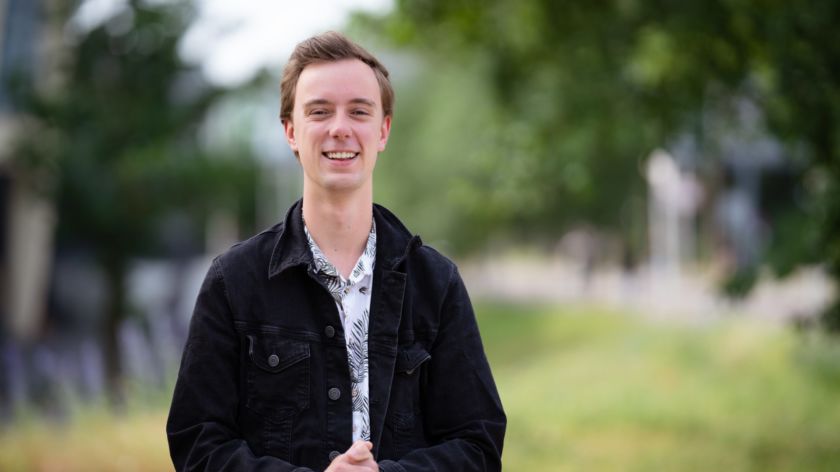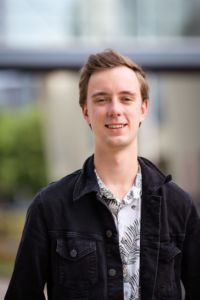It’s time to address taboos surrounding wellbeing, according to asap
-
 Mark Bunschoten, leading candidate for asap. Photo: Johannes Fiebig
Mark Bunschoten, leading candidate for asap. Photo: Johannes Fiebig
From May 30th through June 2nd, students can vote for the University Student Council (USR). Vox interviewed the leading candidates of both participating parties. Mark Bunschoten, the candidate for asap, wants to commit to improving students’ mental and physical well-being.
While in the programme committee, Political Science student Mark Bunschoten (21) found out that you can affect change at the university as a student. The participational bodies are still very important to the bachelor student; that is why he wants to join the USR on behalf of asap, preferably with as many seats as possible.
As leading candidate, you will usually automatically join the USR. What do you hope to achieve?
‘My main goal is to lessen the taboos surrounding social and physical well-being. Breaking them entirely is a little utopian, but I would feel very satisfied if we can open them up to discussion and students feel better and safer as a result.’
Do you have concrete plans to accomplish this?
‘Mostly I want to stimulate the discussion from the university’s direction, because it needs to be made much clearer that there are counsellors and student psychologists available. That is why we should make a care map, which clearly indicates what kinds of care are available and where. That allows you to tackle issues in an early stage.’
‘We should focus on open book exams’

What about asap appeals to you?
‘Our party is both constructive and realistic. Of course, we all have our own plans, but we’re in the USR to make a difference. If that requires some compromises, so be it. I think this is smart because you can accomplish things that way. But asap also has a lot of points I can agree with, such as more attention to well-being.’
That issue is a part of AKKUraatd’s program as well – just like sustainability and hybrid education, for instance. In what way do you distinguish from each other?
‘We often agree on the main points. We differ in how we address those points. AKKUraatd is often more idealistic where we are realistic. Having ideals is not a bad thing – far from it – but the question is whether sticking to those ideals is helpful in the long run. It doesn’t always bring you closer to a solution.’
On to the election program. According to you, exams should be a learning opportunity, not a moment of reckoning. What do you mean by this?
‘The university is still focused too much on “old-fashioned” exams: you memorise some material, go to the exam, tick off a few boxes and you pass the course. But what good is that in the end? We should focus more on open book exams, where command and application of the course material is important, rather than reproduction.
That does not seem feasible for lecturers.
‘This sort of thing is indeed not possible for every course or exam, so that is something that should be arranged in close discussions with the study programmes and the examining boards. However, right now those discussions don’t happen nearly often enough, while the corona times revealed that study programmes can be very creative when it comes to examination. It is important that we learn from this.’
‘The question is if massive lectures are still sustainable.’
Another thing that is important according to you: more green instead of grey on the campus. Isn’t that already in the Campus plan?
‘That’s right. The university claims to address the issue and that’s nice, but we will have to wait and see how everything is going to work out. Besides that there are plenty of other things we could do. Consider the bike sheds underneath the Thomas van Aquino building and the Refter. Hardly anybody knows those exist, while the aboveground storage spaces are always full. If students started parking in the basements more often, the aboveground spaces can be replaced with greenery.’
The words ‘hybrid education’ are seen throughout your program. Do you think old-school lectures are a thing of the past?
‘No, we don’t propose replacing in-person education with online alternatives. We think of them as a nice supplement – because of the flexibility it offers – but we certainly don’t want to be rid of it. The question is if massive lectures are still sustainable. Students are not coming to campus for them anymore, so you have to wonder how to make them attractive again. Because studying together is very valuable.
Now on to campaigning. Are you ready?
‘Definitely. Everything can finally take place in-person again, so we can talk to students on campus. I like hearing about what’s going on and what needs to be changed. We may not be able to convince everyone to vote for us, but my main hope is that everybody votes, period. Last year’s turnout was only 19 percent; we need to do much better.’
Leading candidate interviews
In the run-up to the elections for the University Student Council, Vox spoke with the leading candidates for AKKUraatd and asap. You can read the interview with AKKUraatd’s Hugo van Bree here.



